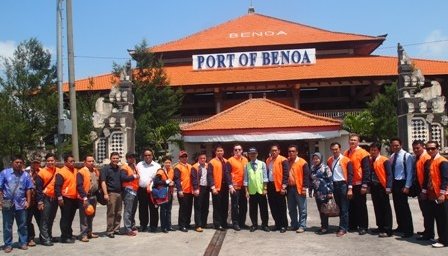Nineteen middle managers from the Indonesian Port Corporations (PELINDO) completed their final two-week modern port management training today in Bali, Indonesia focussed on administrative & legal management, and technical management & human resources development.
For Indonesia, a vast country consisting of hundreds of islands, shipping is crucial to economic development. Yet, in Indonesia the role of maritime transport is still relatively small and limited to areas of high economic activity. As a result, the government has set aside, as part its Master Plan for Acceleration and Expansion of Indonesia’s Economy (MP3EI), US$ 12.75 billion for major transportation projects aimed at developing the country’s sea ports over the next 10 years.
Indonesia’s National Port Management Master Plan specifically aims to improve management within the country’s state-owned port operators, in an effort to increase efficiency and reduce logistics costs. Such is the objective of UNCTAD/TrainForTrade’s Port Training Programme in Indonesia.
 Participants from the Indonesian Port Corporations (PELINDO) at UNCTAD Modern Port Management course |
For Module 7 of the course (administrative & legal management), UNCTAD assigned Mr. Damien Magee, from the maritime law firm Campbell Johnston & Clark to conduct the training. He was assisted by Rati Farini Srihadi, Head of the Legal Bureau of Pelindo II.
The second half of the training, which focused on Module 8 (technical management & human resources development), was delivered by local experts and senior managers from Pelindo I to IV, most of whom have been trained by UNCTAD TrainForTrade during Training of Trainers and Coaches workshops.
With the completion of Module 8, the in-class training part of the programme in Indonesia that began in July 2011 comes to an end. Now the participants must put into practice what they have learned and research and draft a final thesis, which they will have to successfully defend before a panel of international and local port experts in order to obtain the UNCTAD Modern Port Management certificate. This is scheduled to occur in March of 2013.



